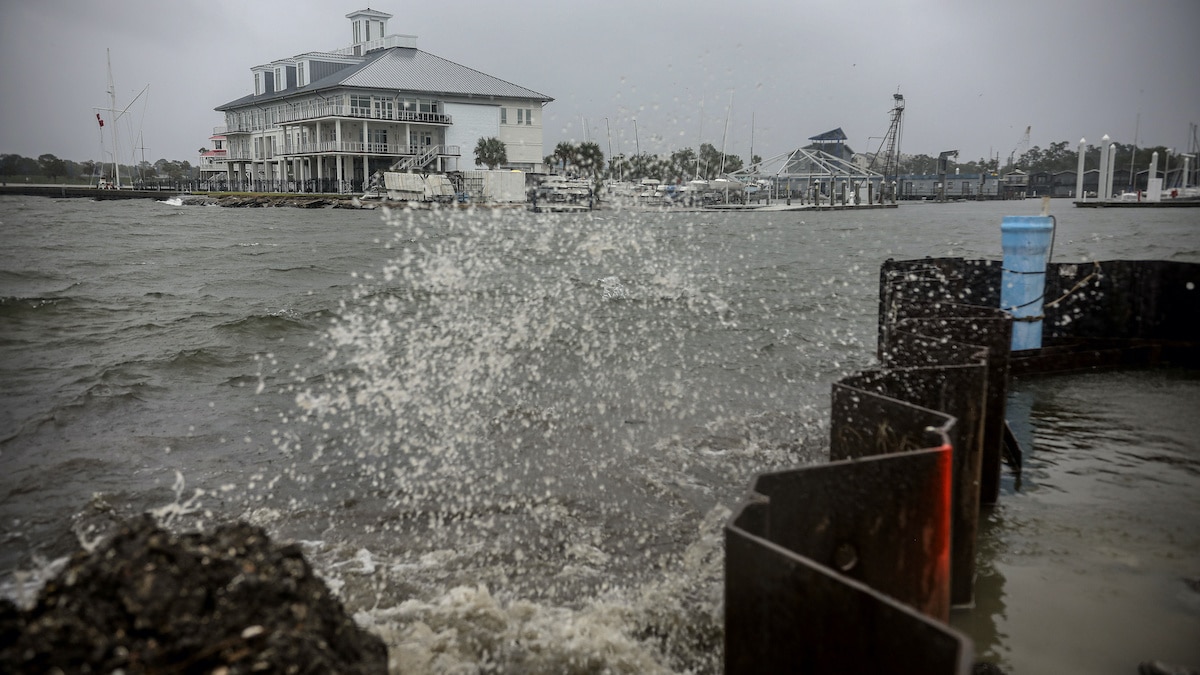
Deadly Hurricane Zeta Breaks Records as Fifth Named Storm to Hit Louisiana

Waves crash over Lake Pontchartrain as Hurricane Zeta makes landfall on Oct. 28, 2020 in New Orleans, Louisiana. Sandy Huffaker / Getty Images
Hurricane Zeta slammed into storm-weary Louisiana as a Category 2 storm Wednesday, killing at least one person and breaking the record for the most named storms to hit the state in a single season.
Zeta is the fifth named storm to clobber Louisiana this year and follows the especially devastating one-two punch of Hurricanes Laura and Delta in August and October. Around 3,600 people are still displaced following the two previous storms and most of them are living in six hotels in New Orleans, which took a direct hit from Zeta, CNN reported.
“It’s one (storm) after the other. We’re just a target. I told my friend they’re zeroing in on us. They’re looking for us,” 71-year-old Laura evacuee Billy Ewing, who has been staying in New Orleans hotels since August, told CNN. “And we can’t control it. What’s the matter right now is we can’t control anything. I’m not in control of what my status is. I’m not in control of where I live.”
Zeta made landfall near the fishing village of Cocodrie, Louisiana around 4 p.m. Wednesday, The New York Times reported. It then tore through New Orleans and ripped along the Mississippi coast.
The storm killed at least one person, NBC News Bay Area reported. A 55-year-old man was electrocuted by a downed power line in New Orleans.
New Orleans had been in the projected path of six different storms this season, but they had all veered east or west. This time, the city’s luck ran out and it took a direct hit.
“This is not a drill,” Mayor LaToya Cantrell warned residents ahead of the storm, as The New York Times reported.
The storm cut out power to more than 500,000 people in Louisiana, and most of New Orleans was dark after it passed, according to NBC News Bay Area. More than 200 trees were downed, and one person was hospitalized with minor injuries after a structure collapsed.
Hurricane Zeta knocks out power on Bourbon Street. @FOX8NOLA pic.twitter.com/sgu7JCzYuO
— Garland Gillen (@garlandgillen) October 29, 2020
“Although we have made it through, we have been damaged, we have been hit,” Cantrell said.
The storm was and is fast moving. This means that high winds were the biggest safety hazard, even blowing the roofs off of some houses, The New York Times reported. However, the advantage of the fast pace meant that it did not stall and pour rain in one place. The climate crisis is making storms wetter, and slow, wet storms have caused major flooding in recent years.
“It’s not going to sit there and pound for hour after hour,” Louisiana Gov. John Bel Edwards said in a briefing on Wednesday, as The New York Times reported. “It should move through the area relatively quickly.”
However, this also means a wide range of the Southeast will feel its effects, CNN pointed out. Strong winds were projected to reach inland Mississippi and Alabama, while heavy rain was projected to pummel Georgia and the Carolinas Thursday.
Zeta weakened to a tropical storm over central Alabama early Thursday morning, the National Hurricane Center (NHC) reported. However, it is still packing a punch. The NHC warned of wind gusts strong enough to down trees and cause power outages in northeastern Alabama, northern Georgia, the Carolinas and southeastern Virginia Thursday.
Here are the 4 AM CDT Key Messages for Tropical Storm #Zeta, which is racing across the southeastern United States with damaging gusty winds and heavy rainfall. For more information particular to your area, visit https://t.co/SiZo8ohZMN pic.twitter.com/73tKR0RYrL
— National Hurricane Center (@NHC_Atlantic) October 29, 2020
As of 6:55 a.m., there were already more than 920,000 people without power in Georgia, WSB-TV 2 Atlanta reported.
Zeta is the earliest 27th named storm on record in an extremely active Atlantic hurricane season and the 11th hurricane, The Guardian reported. An average hurricane season has six hurricanes and 12 named storms. In addition to making storms wetter, the climate crisis is also making them more intense.
- New Orleans Convent Will Become Flood-Resistant Wetland Garden
- Zeta, Earliest 27th Named Storm on Record, Could Hit Gulf Coast as ...
- Hurricane Delta's Rapid Intensification Is Fueled by Climate Change ...
- Louisiana Faces Faster Levels of Sea-Level Rise Than Any Other ...
- Hurricane Delta Floods Parts of Louisiana Still Recovering From ...

 233k
233k  41k
41k  Subscribe
Subscribe 